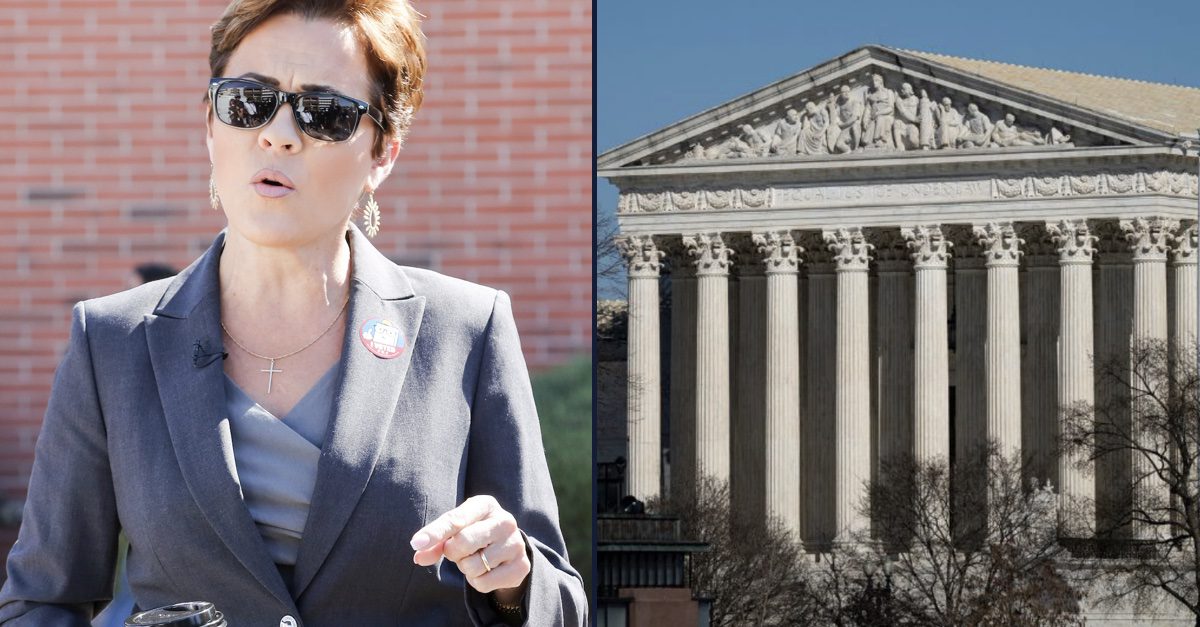

Kari Lake (Alexandra Buxbaum/Sipa USA), U.S. Supreme Court (Graeme Sloan/Sipa USA)(Sipa via AP Images).
Days after asking the U.S. Supreme Court to breathe new life into a lawsuit that seeks to ban Dominion Voting Systems’ machines from use in the state of Arizona, Republican U.S. Senate candidate Kari Lake is asking the justices to accept her case on an expedited basis, so that there will be plenty of time to see her quest through before the 2024 election.
Lake, a former local news anchor who lost in the Arizona gubernatorial race of 2022, docketed, along with fellow Arizona Republican Mark Finchem, a motion to expedite on Wednesday. She cited her current pursuit of federal office, the need for a ruling “as far in advance of the 2024 election at possible,” and “new evidence” to support a speedier consideration of the petition.
“Expedited consideration of this matter is warranted by the seriousness of the issues and their effect on the upcoming 2024 election—not only in the battleground State of Arizona where petitioners reside (and are candidates for federal and state office), but also nationwide,” the motion said. “Petitioners introduced new allegations in their petition to support Article III standing in accordance with 28 U.S.C. §1653. The evidence supporting those allegations introduced here is extraordinary.”
In her petition for a writ of certiorari, Lake claimed the potential security issues with Dominion voting machines made “hanging chads — the very problem the machines were meant to solve — seem like a blessing,” a reference to the Florida recount of 2000.
At root, Lake argued that “new evidence” is enough to establish standing and reverse the lower courts so her lawsuit against Maricopa County and state officials can continue as soon as possible, seemingly in the hopes that there may be enough time to ban voting machines before the 2024 election in Arizona and, perhaps, cause a domino effect across the states.
In the motion to expedite, Lake claimed Dominion’s equipment “violates basic cyber security standards by leaving master cryptographic encryption keys on the machines in plain text, thereby allowing any malicious actor to take control over the electronic voting machines and the election results—without likely detection.” She further claimed that Maricopa County “used illegally altered election software in the 2020 and 2022 elections and falsely represented that this software is certified by Election Assistance Commission.” These “vulnerabilities” and misrepresentations, according to Lake, all amounted to a violation her 14th Amendment right to due process.
In a statement to Law&Crime, a Dominion spokesperson called Lake’s cybersecurity claim “conspiratorial.”
“The claim that access to any single credential could affect the result of an election undetected is implausible and conspiratorial,” the spokesperson said. “Dominion’s machines are fully certified by the U.S. Election Assistance Commission, and elections are secured by many layers of robust operational and procedural safeguards, including auditable paper ballots, that are overseen by local election officials.”
Lake’s lawsuit was previously rejected by the U.S. Court of Appeals for the Ninth Circuit. The lawyers who filed the lawsuit faced sanctions for making unfounded claims. The court of appeals also dismissed the lawsuit for lack of standing, stating that Lake did not show a real and immediate threat of future harm.
When the A three-judge panel confirmed the dismissal. The judges noted that Lake did not provide evidence of any hacked electronic tabulation machines in Arizona and emphasized the strong safeguards in place at the state level.
The panel highlighted the robust safeguards in Arizona's electoral process.
The court concluded that the lawsuit did not support the claim that individual votes would be affected by electronic tabulation, considering the state's strong safeguards, use of paper ballots, and retention of those ballots after tabulation.
Despite the rejections, Lake is urging the Supreme Court to expedite her petition and reverse the lower court's decisions in time for the 2024 election.
